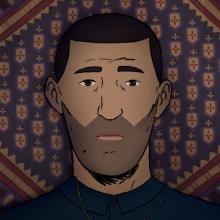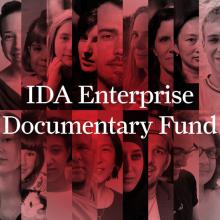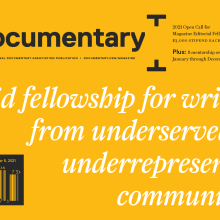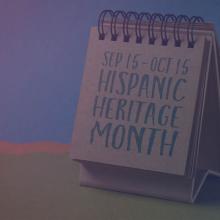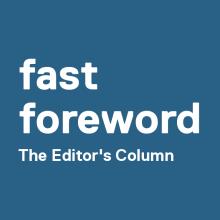It is no secret that documentary filmmaking has a complicated legacy when it comes to supporting the survivors of gender-based violence. Even with the best intentions, many filmmakers fall into dangerous extractive patterns and use practices that end up doing more harm than good for a participant. Last week, IDA and the Documentary Accountability Working Group hosted a panel discussion on how filmmakers and journalists can ethically tell these important stories without harming survivors. Here are six key takeaways from the discussion, as well as suggestions and resources for a trauma-informed
Latest Posts
Oscar-nominated filmmaker Todd Haynes has been fascinated with the mythology and idolatry of celebrity, and the space between artist and fan, throughout his career. The short film with which he first made his name, Superstar: The Karen Carpenter Story (1987), told the tragic story of the pop singer by using Barbie dolls. Haynes returned to this theme with Velvet Goldmine (1998), a fantasy based on the careers of David Bowie and Iggy Pop. And then came I'm Not There (2007), where he explored the mythic Bob Dylan, using six different actors, including Cate Blanchett, to portray the many
Through works that animate the archive, cast towards various futures and play with performance, the films in the 66th Flaherty Seminar deconstruct, disrupt and question what is known, how we know, and the impulse to know or make sense of. The Flaherty Seminar, already operating outside of convention with its film selections hidden from audiences until viewing, becomes even less transparent with this year’s chosen theme: the late Martinique writer/poet/philosopher/critic Édouard Glissant’s theory of opacity. Opacity is of curator Janaína Oliveira’s doing and is in conversation with much of her
The act of “coming out” as a member of the LGBTQ community is often the defining moment of films about queer and trans people. Yet many of these films still struggle to capture the nuances of this experience. Audiences can look no further than to documentaries for a raw and necessary look at what coming out really looks like for LGBTQ people. This National Coming Out Day edition of Docs to Watch presents 7 documentaries that explore “coming out” not just as a singular action, but an ever-evolving process that looks different to different people. Today and every day, let’s uplift films that
Essential Doc Reads is our curated selection of recent features and important news items about the documentary form and its processes, from around the internet, as well as from the Documentary magazine archive. We hope you enjoy! Over at The New York Times, Patricia Aufderheide draws out the “eerie similarities between pre-1948 Hollywood and today’s streaming market.” and cautions us about how players like Amazon harm the larger ecosystem. As Amazon’s founder, Jeff Bezos, has himself put it, "When we win a Golden Globe, it helps us sell more shoes." But does it work for the rest of us? Some
“Did the Ethiopians really defeat the white men at the Battle of Adwa, or was the victory simply boasting?” Haile Gerima asked his father as a young boy. Shouting war songs, and harnessing their traditional art of war skills—“shaking spears and swinging swords"—the Ethiopian patriots “tangled the enemy,” his father assured him. “Anytime an Italian bullet hit them they exclaimed, ‘What flea is this?’” Gerima recreates this exchange in his 1999 documentary on the First Italo-Ethiopian War, Adwa: An African Victory. Over time, Gerima came to understand the drama in the storytelling, the
Meet the latest cohort of 10 films receiving production grants. The Enterprise Fund supports feature-length documentary films telling urgent, revelatory stories underpinned by rigorous journalistic approaches and exemplary artistic achievement.
In its ongoing mission to serve, empower and engage a diverse range of voices, perspectives and experiences from the documentary community, the International Documentary Association (IDA) is calling for applications for its Documentary Magazine Editorial Fellowship program Funded in part by grants from the National Endowment for the Arts (NEA) and the Hollywood Foreign Press Association, this fellowship is designed to enhance opportunities for writers from underserved and underrepresented communities to participate in the editorial planning process at and contribute content to Documentary
Between September and October 15, we celebrate the culture and contributions of the vast and diverse Hispanic communities that call the US their home, while honoring their stories. These stories of courage and grit in the face of struggle—and often disenfranchisement—give us a glimpse into what it means to be Hispanic and American. To celebrate this year, we’ve put together a list of Latinx documentaries that you can stream online. After Maria Directed by Afro-Latinx filmmaker Nadia Hallgren (director of Becoming, the Emmy-nominated doc about former First Lady Michelle Obama), After Maria
Dear Readers, Just as we thought it was safe to reflect on, process and move forward from the maelstrom that was 2020, the Delta variant—a faint whisper when I was assigning articles for this issue, now a thunderous roar as we go to press—is throttling our momentum, if not our resolve. Nonetheless, we persist, in a beyond-2020 world, applying the lessons we learned from the deep dive we all took—as a business, as a community and as an organization—to redefine our core values and reengage with a renewed vigor. Given the ingenuity that festivals, distributors and exhibitors exuded in reimagining




